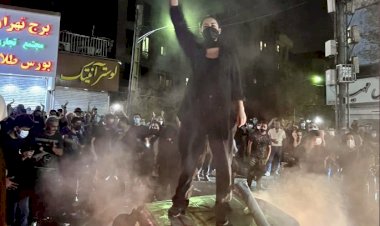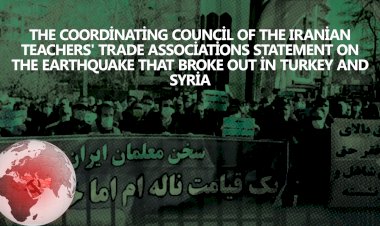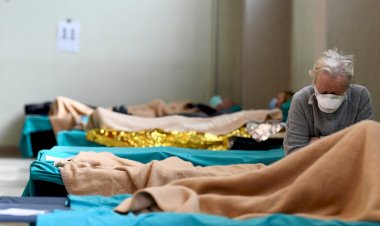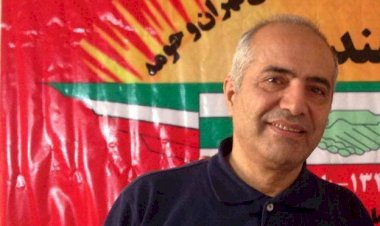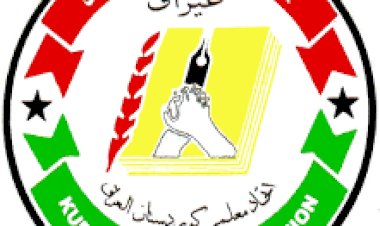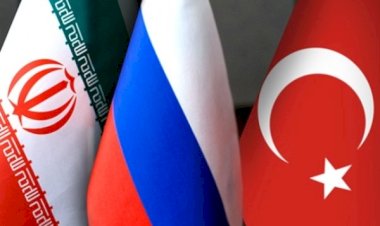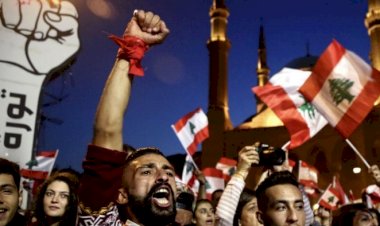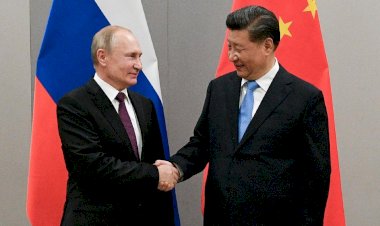Greece: The Return of the Specter of the Past
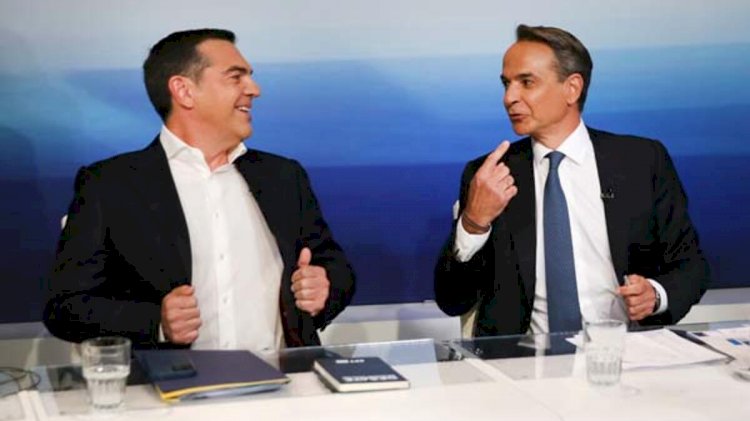
In the early parliamentary elections of 21 May in Greece, the victory of the Greek and EU bourgeoisie was declared. The conservative New Democracy (ND) rose to power, winning 146 seats with 40%. Completing its historical mission, Syriza crashed with 20% of the votes (71 deputies). PASOK received 41 seats with 11%, while the Communist Party of Greece (KKE) took 7% (26 seats). The parties will not form a coalition government: ND has already taken the necessary steps to establish a stronger system by holding elections again on June 25 to come to power alone. Thus, the Mitsotakis family once again took the helm of the Greek ruling class; Syriza, which firmly defended bourgeois interests, turned into a center-left party, lost its raison d'être, and accelerated its dissolution.
|
Syriza percentage of votes |
|
|
2012 May |
%16.8 |
|
2012 June |
%26.9 |
|
2015 January |
%36.3 |
|
2015 September |
%35.9 |
|
2019 |
%31 |
|
2023 |
%20 |
The system was saved as a result of the deepening crisis, general strikes, university occupations, street riots, mass struggles and the severe betrayal of Syriza, which emerged during the first half of the 2010s. The government of social destruction, ND-PASOK, fell from power with the beginning of political and social crises. Syriza, which rose suddenly with the campaign to reject the austerity policies, came to power by forming a government with ANEL in the 2015 elections. A social war had begun that exceeded the size, program and intentions of the pro-EU Syriza. The process represented the danger of loss of control and political crisis for the ruling classes. Even before the reformist Syriza came to power, it negotiated with the Greek and European bourgeoisie and gained their trust. Tsipras kept all his promises. It quenched the anger by drawing the mighty wave of struggle into the system.
As the working class slammed their fist on the table, Greece had turned into an international battle arena of mass radicalism that would open the doors of a revolutionary era. International capital united: the union of creditor bandits, in which Germany plays a leading role, the EU, the European Union Central Bank, the IMF, France, England… All these reactionary forces together began to pounce on Greece, to feed the fascist gangs, to intervene with open threats, and to operate the black propaganda machine. Under the pressure of the masses that shook the country with general strikes, Syriza put the austerity measures to a referendum. Syriza agreed with Troika, despite a strong “no” vote of 61%. After all, the option other than surrender meant breaking away from the EU, rejecting foreign debt, and the control of the workers through expropriations. There was no middle ground. Reformist Syriza never had such plans. The KKE, one of the oldest of the bureaucratic strata, also supported the existing system with loyalty and sectarianism.
Thanks to the forces controlling the union bureaucracy such as KKE and PASOK, the workers were paralyzed. The workers were fighting with the will to struggle. Despite 32 general strikes, the austerity packages could not be repelled. All but two, which were 48 hours, were limited to 24 hours. Explaining the situation merely as the betrayal of Syriza without understanding the roles of the KKE, which fears to death a revolutionary breakthrough, and PASOK, one of the main elements of the system, means ignoring the historical roles of the working class. Although an indefinite general strike was supposed to be declared, this team of bureaucrats did their best to send the workers home as soon as possible.
The austerity packages, which impoverished millions of people, exploding unemployment, and greatly reducing welfare, were enforced. Because there was no intermediate formula: either you will seize the capital or you will surrender to blackmail. Greek workers fought bravely; however, as a result of the betrayal of two decisive actors such as Syriza and the KKE, that great power retreated from the battlefield of class war in defeat.
Greece managed to “avoid bankruptcy”, as the capitalists call it, in 2010, when it signed a ten-year bailout deal with the IMF by borrowing 260 billion euros ($306 billion). It was the workers who went bankrupt: wages were frozen at the 2007 level, the country was privatized in all sectors. Massive cuts were made in all public services, especially in education, health and transport. Pensions were cut in half. Employment has been reduced. Wages fell, taxes increased. Unemployment hit as much as 25%. The result of this deep disappointment and humiliation was the retreat of the working people in this crisis under a suffocating left defeat.
Before everything had started, in 2012, there was a striking incident that fueled the protests again. Retired pharmacist Dimitris Christulas, 77, shot himself in the head with a pistol in Syntagma Square, saying, “We must not leave a bankrupt country to our children”, according to eyewitnesses. The suicide note he left behind was as follows:
The Tsolakoglou government has annihilated all traces for my survival, which was based on a very dignified pension that I alone paid for 35 years with no help from the state. And since my advanced age does not allow me a way of dynamically reacting (although if a fellow Greek were to grab a Kalashnikov, I would be right behind him), I see no other solution than this dignified end to my life, so I don’t find myself fishing through garbage cans for my sustenance. I believe that young people with no future will one day take up arms and hang the traitors of this country at Syntagma square, just like the Italians did to Mussolini in 1945.
The resilience of this powerful people's legacy of struggle, whose grandparents fought the partisan resistance and whose children overthrew the juntas, unfortunately could not meet with a revolutionary alternative. The price is heavily paid.
The “sick man” of the EU, Greece has once again become a safe haven for capital “investment”. As the rising rage of the people rejecting IMF debts, austerity packages, and impoverishment; Syriza committed all these betrayals under its own government: it completed its mission to save the system in the best possible way on behalf of the ruling class. This was an opportunity for the socialist left in Turkey (especially Left Party) to take stock of this issue, particularly Syriza’s Eurocommunism - mass party model, which clearly is the rejection of proletarian radicalism and workers’ power.
Devastation
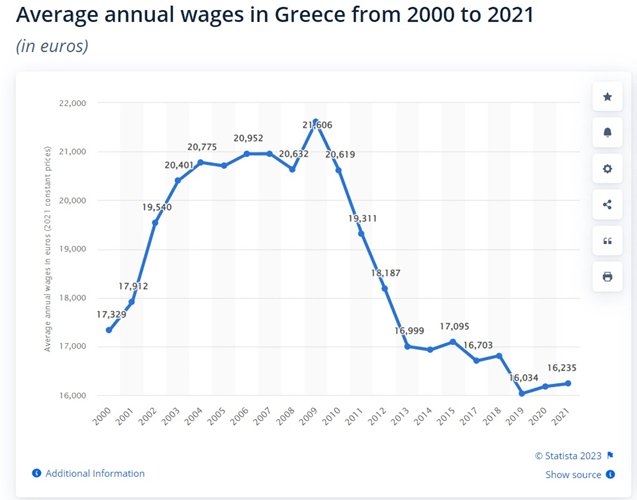
The graph shows how the workers were impoverished. When the crisis hit the country in 2009, average annual wage was 21,606 euros, in 2021 it fell down to 16,235 euros. The heaviest attacks - such as cheapening labor, long working hours and precarious work - were quickly put into practice and the crisis of the capitalists was dispelled. Thus, the wheels began to turn again. The balances, under the decisive influence of the energy of struggle between the working people and the international capital, came to an end: ND won the elections. The guardian angel of the Greek ruling class, ND and the last leader of the Mitsotakis family, came like a specter summoned from the past. Papadapoulos, Mitsotakis, Karamanlis… These most loyal servants, who have been influential in every level of Greek politics, were at work once again.
The attacks of the Mitsotakis government continued to target all the vested rights of the workers. Overtime wages given to those who work more than 40 hours a week were no longer the liability for employers! Instead of overtime wages, there was a horrific attack of flexible working with 'compensation time off’. In the same law, strike and union bans were introduced and the workers' weapons of defense were taken from them. Syriza took a mid-range position even for an attack of this level. So what did the KKE do? They too, together with PASOK, have of course declared a ostensible 24-hour strike for a controlled release of energy!
In the winter of 2022 following the Ukrainian war, Greek workers were on the street again in the actions that started with the energy crisis all over Europe and turned into a general mass action against the cost of living. The union confederation of the KKE, PAME, decided to go on strike on May 1, perhaps to give the energy of the broad and promising general strike on April 6 a rest. The same old story took place after 57 people died in the train disaster that came out blatantly as a result of privatization.
It is seen that the votes of the KKE increased slightly in the last election and the left votes fleeing from Syriza went to the KKE. The KKE, which has been running a very moderate campaign, seems to have gotten what it expected by making the former Syriza deputies candidates. As a party within the system, it does not disturb the ruling class. It will do its job as usual to absorb the energy of the working class in a controlled manner. It will be seen that the KKE votes given in the table below do not reflect the tension of the masses and cannot excite the masses. It was fixed at around 5.5% even at the height of the struggle. Therefore, it appears that the 2-percent increase in votes was largely from the left of Syriza.
|
KKE percentage of votes |
|
|
2012 May |
%8.5 |
|
2012 June |
%4.5 |
|
2015 January |
%5.5 |
|
2015 September |
%5.6 |
|
2019 |
%5.3 |
|
2023 |
%7.2 |
The Financial Times heralded the victory of the capital with these words: “More than a decade after bailouts and austerity measures pulled Greece from the brink of bankruptcy and a eurozone exit, the country has rebounded and is on the cusp of regaining its investment-grade rating”.
The world markets welcomed Mitsotakis' election victory with a wave of joy: “His victory is widely expected to spur an upgrade of Greece’s key credit rating to investment grade, which it lost during the financial crisis. That would strongly boost the country’s ability to borrow from international markets, broadening its bonds’ appeal to investors”.
The general recovery trends in the Greek economy strengthened the ruling class. For now, the increase in the cost of living may not show its effect in the fastest way (just like in Turkey) due to the decrease in unemployment. The raise in wages before the election against rising inflation and the promise for a better raise seems to have appealed to the workers' interest for "stability". But the impoverishment will continue and the escalation of the workers will become inevitable.
It can be seen in the graph that unemployment rates, which approached 28% in 2013, decreased until 2022 to 12%. In this way, the system was able to ensure the retreat of the masses despite the impoverishment.
Greece unemployment rate by year
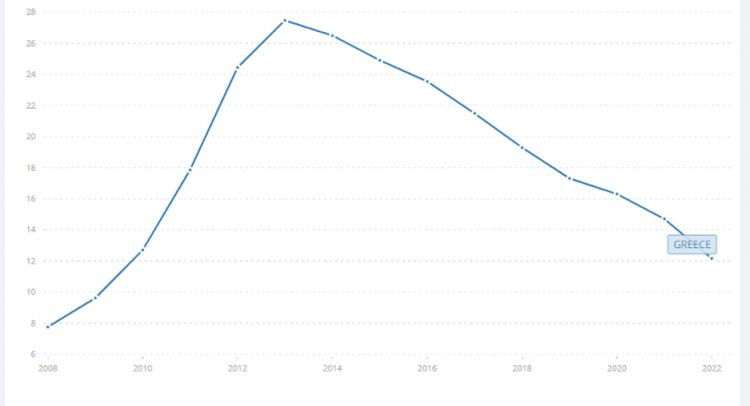
Source: World Bank
Revolutionary Left
The Greek workers resisted with all their might to avoid paying the bitter pill, but the leadership crisis could not be overcome. It would have been possible to break the influence of the union bureaucracy (i.e. PASOK and KKE) by declaring an indefinite general strike, for the advancement of the masses that exerted tremendous pressure on Syriza. This depended on the intervention capacity of a revolutionary leadership that had gained the trust of the masses at the grassroots. Antarsya was the only group that could be in this position, but could not make the move to win the leadership of the masses. With the united front tactic, it could win the masses to the left of Syriza, develop tactics and maintain the movement to the left. Unfortunately, it was unable to push Syriza's grassroots forward. Failing to do so has obscured how Syriza and the KKE actually stood in the way of class radicalism. As a result, the masses retreated in desperation. Splits from Syriza, the disintegration of party cadres, and lack of motivation dominated the left. Antarsya also had its share of this crisis. This mood also extended the life of Syriza by generalizing the idea that "there was nothing else to do". From this point of view, despite such great betrayal, we can even see 20% of the votes as a success.
Although it is not reflected in the ballot boxes for now, the effects of the crisis, especially high costs, are overwhelming the masses in Greece. Antarsya needs to overcome its idleness and build a real front of de facto struggle that will be the address for a left break from Syriza. It is inevitable that the class struggle will heat up again in many European countries. The preparation of the workers for this wave is the most urgent task at the moment.




